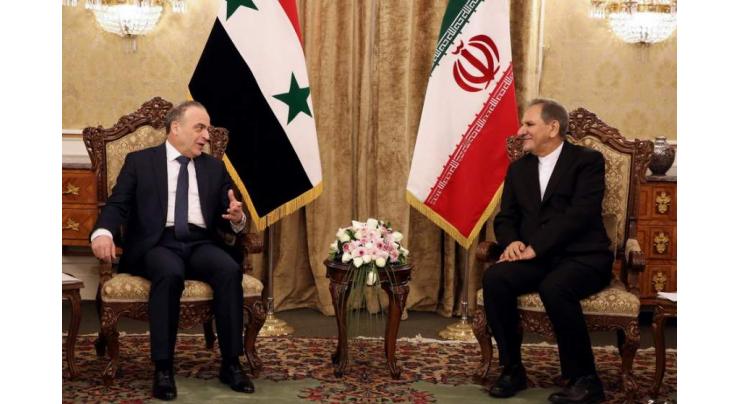
Iran Signs Phone, Petrol Deals With Syria
Fakhir Rizvi Published January 17, 2017 | 11:25 PM

TEHRAN, , (APP - UrduPoint / Pakistan Point News - 17th Jan, 2017 ) - Iran will build a mobile phone network and petrol terminal in Syria under deals signed in Tehran on Tuesday during a visit by Prime Minister Imad Khamis, Iranian media reported.
The five deals include a "licence for a mobile phone operator, the transfer of 5,000 hectares for the creation of a petrol terminal and 5,000 hectares for farmland" in Syria, according to the IRNA news agency.
Iran will also have the right to operate phosphate mines in Sharqiya, about 50 kilometres (30 miles) south of the ancient city of Palmyra, and to invest in an unnamed Syrian port. First vice-president, Eshagh Jahangiri, said Khamis's visit marked "a new page for economic activities between the two countries".
"The recent victories in Syria are due to the resistance of the people, the Syrian army... and the cooperation on the ground and politically between Iran and Syria," he said at a news conference with Khamis.
At a separate press conference later in the day, President Hassan Rouhani welcomed the fragile ceasefire in Syria.
"Iran wants the ceasefire to continue, that the negotiations continue, that the war against Daesh (the Islamic State group) and the Al-Nusra Front continues so that Syria achieves a stability and a peace so that it can hold a real election," said Rouhani.
Khamis, who arrived with a large business delegation, said the two countries were in "the same trench". He was also due to meet Ali Shamkhani, secretary of the Supreme National Security Council, which oversees political and military cooperation with Russia and Syria.
Iran will take part in Syria peace talks alongside Russia and Turkey in the Kazakh capital Astana on January 23 aimed at building on a fragile ceasefire with rebel groups. "There are negotiations between the government and the (rebel) groups present on the territory that could be serious," Rouhani said.
"Iran, Russia and Turkey have made a lot of effort to ensure these negotiations in Astana... these countries have influence and can make it work."
Related Topics
Recent Stories

Govt committed to developing gems, jewellery sector: Minister

Three new bills introduced in Senate

Nine dead, 1,318 injured in Punjab road accidents

Ukraine, Russia exchange fire, at least seven dead

1st-ever National Sports Revival conference starts next month

Joint venture decided for action against MEPCO’s defaulters

Modern irrigation system imperative to deal with water scarcity: UAF VC

Bringing 4.4mln hectares suitable land under olive cultivation to address econom ..

One woman died after speedy bus overturned

155 killed in Tanzania as heavy rains lash East Africa

Parliament committed to resolve public issues on priority basis: Ghulam Mustafa

Collaborative Care of Diabetes Centre inaugurated in Faisalabad
More Stories From World
-

Ukraine, Russia exchange fire, at least seven dead
1 hour ago -

155 killed in Tanzania as heavy rains lash East Africa
1 hour ago -

US economic growth slows significantly in first quarter
1 hour ago -

Macron warns 'mortal' Europe needs stronger defence
1 hour ago -

COP29 host says deal on climate aid essential but offers few details
2 hours ago -
Ukraine jails couple for helping Russia strike hospital
2 hours ago
-
Togo opposition asks W.Africa court to overturn reforms
2 hours ago -
Paris landmark Moulin Rouge's windmill sails collapse
2 hours ago -
Ahead of feared Rafah invasion, Palestinians mourn bombardment dead
2 hours ago -
155 killed in Tanzania as heavy rains cause floods, landslides: PM
2 hours ago -
Car giants vie for EV crown at Beijing's Auto China show
2 hours ago -
Chinese defense minister to attend SCO meeting in Kazakhstan
3 hours ago




